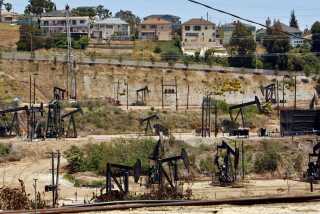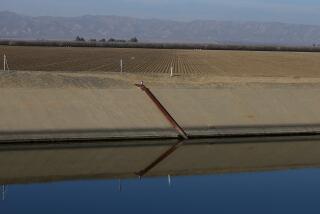Occidental’s $3.7-Billion Bid Buys Elk Hills Field
- Share via
In the largest sale of U.S. government property ever, Occidental Petroleum of Los Angeles won the bidding for the historic Elk Hills Naval Petroleum Reserve near Bakersfield by agreeing to pay $3.65 billion, the Energy Department said Monday.
Oxy outbid 22 others, including Chevron and Arco, by paying more than 50% above the government’s estimate of what the oil field was worth a year ago. Oxy is acquiring the government’s 78% interest in the oil field; the rest is owned by Chevron.
The high purchase price reflects the growing premium paid for domestic oil reserves at a time when some energy economists are predicting that oil prices will rise in coming years. It also demonstrates Oxy’s belief that it can use advanced technology to extract significantly higher quantities of crude than Elk Hills now renders.
The Elk Hills sale--the largest U.S. privatization since the government’s 1987 sale of Conrail in a $1.65-billion public stock offering--caps White House efforts dating to the mid-1980s to unload an unneeded but valuable asset.
But political opposition to the sale stalled passage of enabling legislation until early 1996, when President Clinton pushed through his National Defense Authorization Act giving the green light to an auction.
In an interview, Energy Secretary Federico Pena said that most of the proceeds from the sale will go to reduce the federal budget deficit. “This is a good deal for the taxpayer and delivers on President Clinton’s promise to make the government work better and cost less,” Pena said.
But the federal government won’t get all of the $3.65 billion. Nine percent of the sale price, or more than $300 million, will go to the California State Teachers Retirement System as part of a settlement last year of an ownership tiff between the federal and state governments.
For Oxy, the purchase will add the equivalent of about 1 billion barrels of crude oil to its reserves, tripling its U.S. crude holdings and doubling its domestic natural gas inventory. Elk Hills, one of the 11 largest oil fields in the lower 48 states, encompasses 47,000 acres, 1,000 producing oil wells, a power plant and a gas processing plant.
*
Oxy said it would sell its MidCon natural gas pipeline and marketing system to help pay for the Elk Hills purchase. The company said the MidCon sale should raise $3 billion.
The Elk Hills reserve was set aside by the government at the turn of the century to ensure sufficient fuel for the Navy, which was then converting its vessels from coal-fired to oil-fired. But the oil reserves are now superfluous from the government’s point of view.
The government will, for the time being, retain two other working oil fields, one called Buena Vista near Elk Hills and another in Teapot Dome, Wyo. Those fields produce less than 2,000 barrels of oil a day, a tiny fraction of Elk Hills’ output.
The Elk Hills field and the oil reserve in Teapot Dome figured in one of the nation’s great political scandals. President Warren G. Harding’s interior secretary, Albert D. Fall, went to prison for accepting $400,000 in bribes from two oilmen in 1921 in return for special leases on the two reserves. The episode became known as the Teapot Dome Scandal.
(One of the accused oilmen was Edward L. Doheny, whose discovery of oil near Los Angeles in 1892 started the city’s petroleum era. Doheny was ultimately acquitted of criminal bribery despite the fact that Fall was found guilty of accepting a bribe from him.)
Opponents to a sale of Elk Hills have argued that it would weaken the country’s defense against an oil shortage. But its usefulness would be limited in such a situation because it takes a long time to boost production from a working oil field. By contrast, the Strategic Petroleum Reserve established in the 1970s stores more than 500 million barrels of crude in underground salt domes along the U.S. Gulf Coast, from which large volumes of oil can be quickly withdrawn.
Elk Hills is anything but superfluous from a petroleum perspective. While saying that Oxy’s price for Elk Hills may be a bit rich, energy consultant Philip Verleger of the Brattle Group in Cambridge, Mass., said Oxy and others have good reason to think oil prices are headed up and that reserves are worth more now.
“Many of us have been predicting oil prices would be going down for the last year. But like the proverbial brides at the altar, we’re still waiting,” Verleger said.
*
Advanced petroleum recovery methods, Oxy said, will also enhance Elk Hills’ value. The company said it will boost daily oil production from 48,000 to 80,000 barrels per day over an unspecified period. Gas production will more than triple, Oxy promised.
Pena agreed that there is room for production growth at Elk Hills. He attributed the decline in the field’s daily oil production from its 1981 peak of 180,000 barrels to the current 60,000 barrels to the government’s lack of capital and technology.
“The government is not in the business of running oil fields and Oxy will have the resources to operate it much more efficiently,” Pena said.
Wall Street apparently believes that Oxy can follow through, as investors bid up Occidental shares by $3.06, to $29.88 a share, in Monday trading over the New York Stock Exchange, a 52-week high and an unaccustomed filip for long-suffering Oxy shareholders whose stock was been a notable underperformer for years.
Investors were also cheered by the company’s announcement Monday that it planned to spend $1 billion to buy back up to 40 million of its 330 million outstanding shares.
The Elk Hills deal surprised some oil analysts because Oxy in recent years has concentrated its oil development in far-flung, often dangerous Third World locales including Africa, South America and the Far East. But the consensus of Oxy watchers was favorable.
“This gets them out of the pipeline business, which is pretty dull, and moves more assets into oil and gas, where they have identified growth potential,” said Sal Ilacqua, energy analyst with Rothschild Inc. in New York
*
* EXECUTIVES’ PAY
Occidental’s top two officials will get $112 million to change their contracts. D1.
More to Read
Sign up for Essential California
The most important California stories and recommendations in your inbox every morning.
You may occasionally receive promotional content from the Los Angeles Times.













